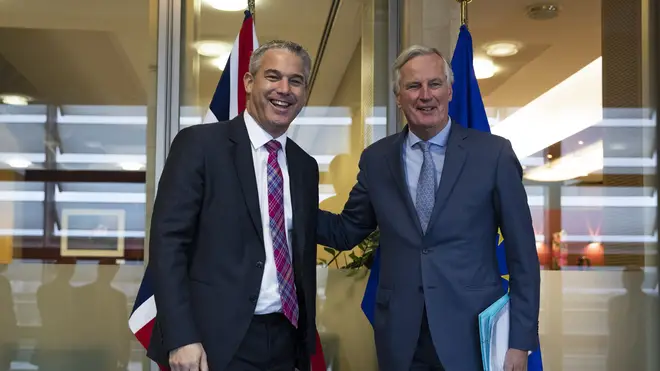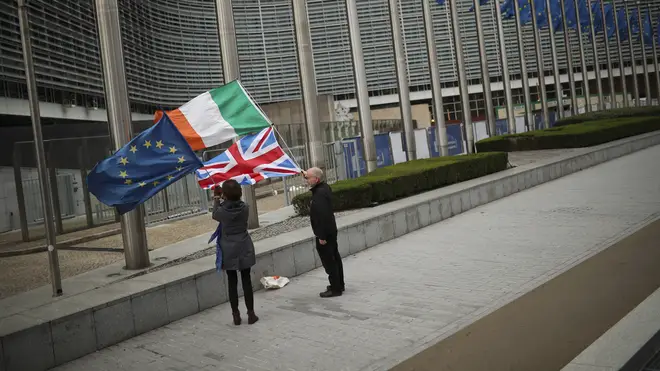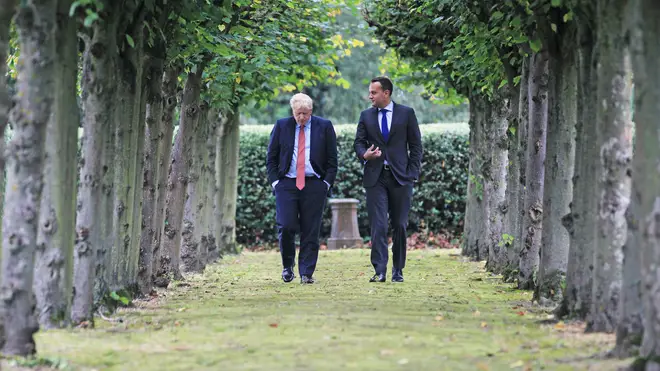
Ben Kentish 10pm - 1am
11 October 2019, 15:54

EU chief negotiator Michel Barnier and UK Brexit Secretary Stephen Barclay held a "constructive" Brexit discussion in Brussels as leaders from both sides eye progress on a divorce deal.
Both camps were encouraged by Friday morning's meeting despite Mr Barnier comparing the UK's departure from the EU to "climbing a mountain."
As the French politician left, he told reporters: "We had a constructive meeting with Steve Barclay and the British team and now I'm going to debrief the 27 ambassadors and the Brexit steering group of the [European] Parliament.
"I've already said that Brexit is like climbing a mountain: we need vigilance, determination and patience."
The UK government also described it as "constructive" in a statement released on Friday.

Today's dialogue has paved the way for the "tunnel" phase of intensive and secretive discussions between the two sides.
Following his meeting with the Brexit Secretary, Mr Barnier spoke with the EU27 ambassadors who, the European Commission said, agreed to "intensify discussions over the coming days."
The lukewarm positivity was echoed in comments made by European Council President Donald Tusk about Boris Johnson's meeting with Irish Taioseach Leo Varadkar.
Mr Tusk welcomed "positive signals" following the meeting between the Irish and UK leaders, however he warned the UK had still not offered a "workable, realistic proposal."
The UK has still not come forward with a workable, realistic proposal. But I have received promising signals from Taoiseach @LeoVaradkar that a deal is possible. Even the slightest chance must be used. A no deal #Brexit will never be the choice of the EU.
— Donald Tusk (@eucopresident) October 11, 2019
Both Mr Johnson and Mr Varadkar said they could "see a pathway" to a possible deal in the week ahead, leading to speculation over a possible compromise on the contentious issue of the backstop in Northern Ireland.
The Irish leader said of those talks: "I think it is possible for us to come to an agreement, to have a treaty to allow the UK to leave the EU in an orderly fashion, and to have that done by the end of October, but there's many a slip between cup and lip.
"In terms of how long it will take, I can't predict that with any certainty, but I think all sides would like there to be an agreement next week at the Council if possible."
Discussions over the last two days have raised the UK prime minister's prospects of obtaining a last-minute agreement with the European Union, with even the pound rallying the most against the dollar since March following the talks.

As talks between Mr Barnier and Mr Barclay were ongoing, Donald Tusk revealed he had threatened the UK Prime Minister with publicly announcing all opportunities and avenues for a deal being agreed prior to the crucial EU summit on 17 and 18 October had been exhausted.
However, he decided to hold out for the "slightest chance" of success after speaking with the Irish Taioseach.
"I have received promising signals from the Taoiseach that a deal is still possible," Mr Tusk said.
"Of course there is no guarantee of success and the time is practically up, but even the slightest chance must be used."
Neither Mr Varadkar or UK government sources would comment on "concessions" made by either side, after acrimonious exchanges between several European leaders in the days leading up to their chat.
Mr Johnson needs to return from next week's summit of heads of EU governments with a deal that MPs can agree on in order to not face demands to comply with the Benn Act on 19 October.
Otherwise, he will be legally bound to ask the EU for an extension to Article 50 which he had previously said he would rather be "dead in a ditch" than do.
He will need the support of the DUP, hardline pro-Brexit Conservatives and possibly opposition MPs if he wishes to push a deal through the House of Commons.